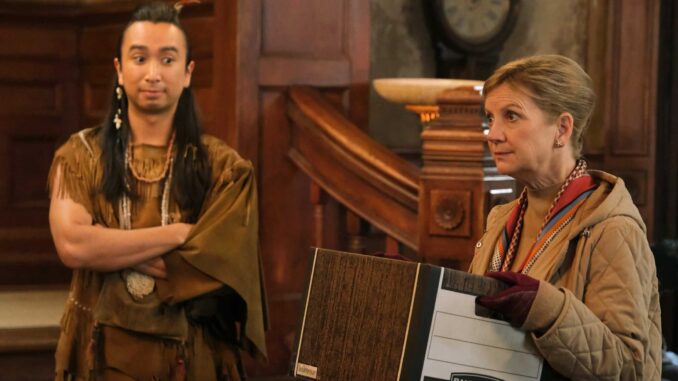
The Spectral Farewell Tour: Seven Ghosts We Should Leave Behind After Season Five
Ghosts, the delightful sitcom about a young couple renovating a dilapidated mansion inhabited by a motley crew of spirits, has charmed audiences with its heart, humor, and surprisingly deep character work. However, even the best shows must know when to say goodbye. As we approach the fifth season, and assuming the show's creative well remains strong, it's crucial to consider which ghosts, having served their purpose, would benefit from a peaceful, comedic "crossing over" to the great beyond. This isn't about dislike; rather, it's about recognizing narrative saturation and preventing stagnation. Here are seven ghosts who, for various reasons, should consider packing their spectral bags after Season Five.
First, and perhaps controversially, we must consider Trevor Lefkowitz. Trevor, the pantsless finance bro, has been a comedic goldmine. His hedonistic tendencies, oblivious narcissism, and inability to grasp the ramifications of his actions have provided endless laughs. However, Trevor's arc has largely plateaued. He's had moments of growth, like helping Hetty and understanding his parents' affection, but fundamentally, he remains the same immature lothario. Repeating this pattern in Season Five would risk him becoming a one-note joke. A fitting send-off could involve a genuine act of selflessness, perhaps even sacrificing something he holds dear (like his access to Wi-Fi) for another ghost, finally earning him the peace he's secretly craving.
Next on the list is Flower, the perpetually stoned hippie. While Flower’s free spirit and often unintentional wisdom have been endearing, her narrative potential is largely tapped out. Her romance with Thor reached a heartwarming conclusion, and her past trauma has been addressed in meaningful ways. Continuing her story beyond this point risks diluting her character into a caricature of her earlier, more nuanced self. A suitable farewell could involve her finding a new sense of purpose, perhaps guiding other lost spirits or finally understanding the true nature of enlightenment, leading her to move on.
Moving on to the colonial era, we have Nigel Chessum. Nigel's uptight demeanor, repressed emotions, and unrequited love for Isaac have provided a contrasting foil to the more flamboyant ghosts. However, his character has become somewhat predictable. His rigid adherence to societal norms and constant disapproval offer diminishing returns for comedic value. A powerful send-off could involve him finally confessing his feelings to Isaac, regardless of the outcome, and embracing a newfound sense of freedom and self-acceptance, allowing him to finally find peace.
Furthermore, we must consider Alberta Haynes. While Alberta's sassy attitude, glamorous dreams, and tragic backstory have made her a fan favorite, her story has largely centered on her unrequited love and the mystery surrounding her murder. The show has explored these elements thoroughly. Further exploration could feel repetitive. A fitting exit could involve the truth of her murder finally being revealed, bringing closure to her soul and allowing her to pursue her artistic ambitions in the afterlife, perhaps forming a spectral jazz band.
Another character ripe for a fitting conclusion is Sasappis. While Sasappis’ sarcastic wit and deadpan observations are consistently amusing, his narrative has remained largely static. He primarily serves as a comedic commentator, and his character development has been minimal. A meaningful departure could involve him using his storytelling abilities to help others, perhaps guiding lost spirits to understanding or finally completing his own unfinished story, allowing him to finally find the recognition he craves.
Expanding the scope, we turn to The Captain. This unseen character, only referenced through Isaac's stories, has become a running gag. While the mystery surrounding the Captain is intriguing, prolonging his absence beyond Season Five risks turning him into a deus ex machina device, wheeled out whenever the plot needs a convenient resolution. The show should either introduce him and provide a satisfying conclusion to his relationship with Isaac, or simply let him fade into the background, allowing Isaac to move on and develop as an individual.
Finally, we arrive at Elias Woodstone, Sam's ancestor. While his villainous presence injected a much-needed dose of antagonist energy, his motivations and methods have become somewhat predictable. He is a greedy, power-hungry ghost focused on manipulating the living to achieve his own selfish goals. Prolonging his machinations risks making him a cartoonish villain. A fitting end could involve him being confronted with the consequences of his actions, forced to acknowledge the harm he has caused, and ultimately, choosing to repent, thus breaking the cycle of negativity and allowing himself to find redemption.
Ultimately, the decision of which ghosts should "move on" is a complex one, balancing the desire to entertain with the need to maintain narrative integrity. By carefully considering which characters have exhausted their potential, Ghosts can ensure that its final season remains fresh, funny, and ultimately, a satisfying conclusion to a beloved series. Let these spectral beings find their peace, allowing the show to evolve and avoid becoming haunted by the ghosts of its own success.